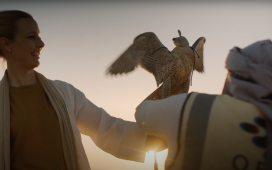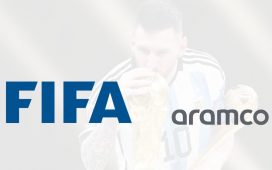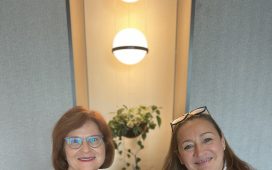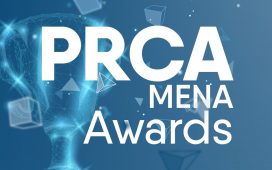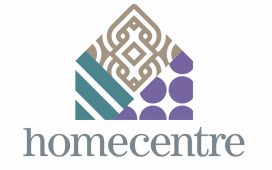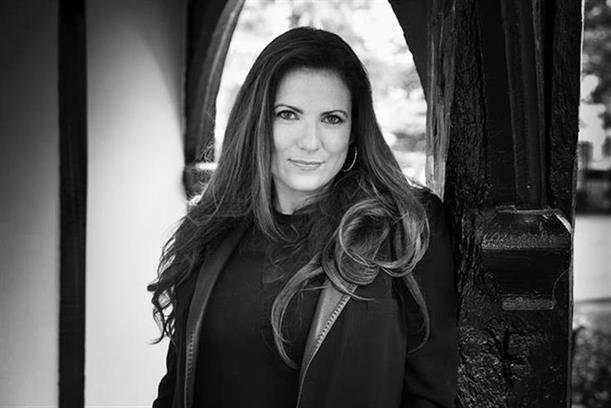
If there’s one thing I’ve learned in 14 years at The Marketing Society, which I left this week, it’s the importance of sharing stories.
We need to share more stories with each other, more of the time. We need to share stories about our industry, about our brands, about our leadership challenges and also about ourselves as human beings.
My story is about something that I think we can all suffer from: imposter syndrome.
When I became the society’s chief executive in 2017, I felt it acutely. I was too young, too female, too different from what had been before. What right did I have to step on to the stage and address a room full of brilliant marketing leaders?
Everything changed once I found the courage to acknowledge these feelings and talk about them. Daring to be vulnerable meant I started feeling braver for a start. And I also realised that I could do things differently from the past.
In March 2017, we launched a new kind of Marketing Society gathering called a Fishbowl. Instead of a conventional event where speakers address an audience from a raised platform sharing wisdom and insights, the Fishbowl was an altogether more democratic space where everyone could speak up.
The audience becomes the speakers and everyone is encouraged to stand up and share a story. It was about giving everyone a voice.
This first Fishbowl event was all about mental health – at the time a somewhat taboo subject. Following a conversation I’d had with the irrepressible Robin Wight, we found that mental health was something that was talked about behind closed doors and inside HR departments.
It was not regarded as a relevant topic for a society event. Except, of course, it was. Because all our members, who are all brilliant marketers, are also human beings who have good days and bad days. I wanted to create a safe space to acknowledge their humanity as well as their brilliant marketing skills. It worked.
One by one, as we sat in a circle together, nearly everyone in the room stood up and talked candidly about their mental health. That night, something changed in the way we started interacting as a community.
Mitch Oliver, Mars’ global vice-president – corporate brand and purpose, was there and remembers it well: “People opened up. People cried, laughed and, yes, I did join in. Ever since, the society has been challenging taboos, sparking conversation, catalysing connection. Being brave. It certainly isn’t boring.
“It’s why I joined the board. Marketing needed this – fresh energy, permission to be itself. The society does that; creating safe spaces for us as an individual and collectively as a discipline to free ourselves from the past and be a part of a more open, braver, more exciting future of marketing.”
Being brave
Since that first Fishbowl, we’ve created a space for people to feel comfortable about having uncomfortable conversations.
All around the world, we’ve talked about race, gender, mental health, sexual harassment – the things that matter that are normally kept behind closed doors.
And that is essentially what The Marketing Society’s “Brave” agenda is all about – it’s about people sharing their stories, standing up, stepping in, as we help one another with all these challenges.
Syl Saller, Diageo’s outgoing CMO and The Marketing Society’s president, also believes that our “Brave” agenda has had a ripple effect on our marketing leaders and the industry at large: “It has enabled conversations that wouldn’t have happened and enabled more people to bring their authentic selves to work, which I believe helps people flourish and drives better performance.
“The ripple effect of the society’s work is immense. Think about it – with over 3,000 influential members, each of whom impacts 100 people in their network to be just that bit braver, you’ve got 300,000 people dealing with issues that will make a difference in people’s lives and in our communities.”
We are convinced that bravery makes better marketing, so with our friend, global marketing leadership expert Thomas Barta, and partner Kantar, we decided to get a better understanding of what it actually means by undertaking the world’s largest study on bravery in marketing.
Over 1,200 participants from more than 60 countries took part and the results exceeded our expectations.
When it comes to business results, brave leadership accounted for over 50% of people’s success. That meant brave leadership is more important than people’s workplace (25%) and even their skills and expertise (20%).
For success in marketing, bravery isn’t just important – it is essential. But it’s not about being brave all the time. It’s about being brave when it really matters.
We never planned for the results of our study to come out during the biggest crisis of our lifetime, but now more than ever marketers need to be brave and we are seeing this everywhere in our industry at the moment.
So, as I formally step down as chief executive of The Marketing Society, I’d like to encourage you all to carry on sharing stories.
Talk about the stuff that really matters. Speak out. Don’t be afraid of admitting to your vulnerabilities. It’s good for you, it’s good for our brands, it’s good for our industry and it’s also good for society at large. That’s how we make a difference.



